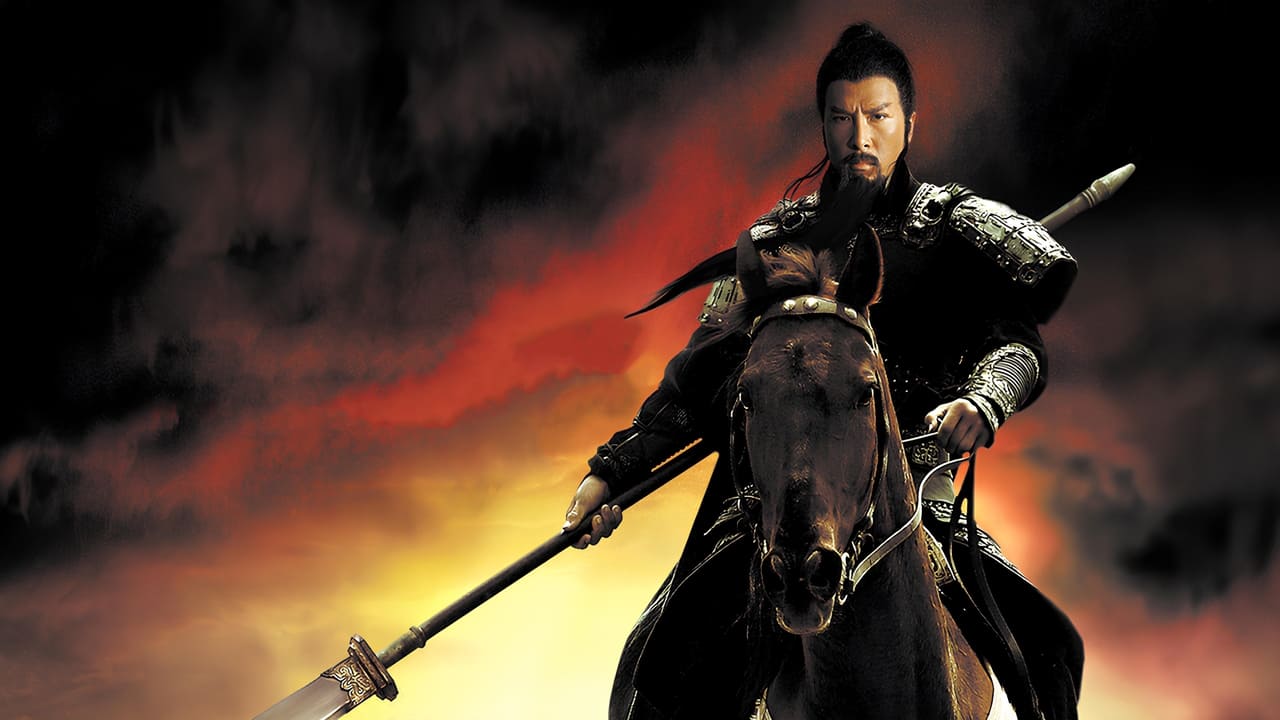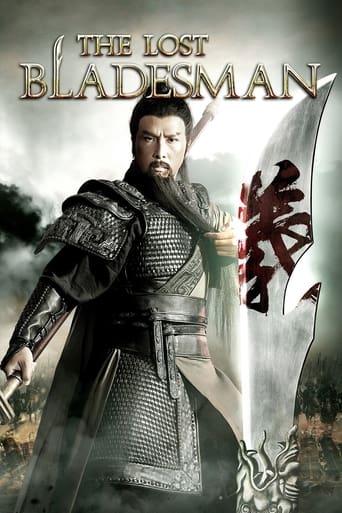

I gave it a 7.5 out of 10
... View Moregood back-story, and good acting
... View MoreAbsolutely amazing
... View MoreFanciful, disturbing, and wildly original, it announces the arrival of a fresh, bold voice in American cinema.
... View MoreI agree with other reviewers that this film has been overlooked as a martial arts action flick. The movie offers two bona-fide stars, Jiang Wen and Donnie Yen, one who can act and one who can fight. Production values are high with nicely detailed "historical" temples and towns and costly on-scene locations amidst China's "eternal" hills and forests. The directors, known for their earlier Infernal Affairs, do a good job in creating a seamless narrative that follows every Hollywood convention in terms of story and character development. At the same time, they include the occasional cinematic surprise, such as the extended scene which closes the doors on all the action, only allowing the viewer an acoustic glimpse of the butt-kicking taking place (note that the 15th century Ming-dynasty novel actually does something similar in the fourth chapter, when Guan Yu rides out after Cao Cao offers him a cup of warm wine and returns, after much noise drifting over from the battlefield, to toss the decapitated head of his enemy to the ground. When he finally accepts the cup of wine, it is still warm). Personally, what I found most interesting is the way the movie reinterprets standard "history." Tales of The Three Kingdoms are a dime a dozen and usually it is Cao Cao who is depicted as a ruthless villain. This movie instead shows him as a thoughtful statesman who has no choice but make sometimes unpopular decisions (such as killing thousands, ten thousands of people). Unlike a previous reviewer, I have no problems with this deviation of the standard narrative because it is "ahistorical." Most standard histories, at least up until the 11th century, were more sympathetic to Cao Cao than Liu Bei and it is only in the more popular versions of the story, most notably the Ming novel, that Liu Bei becomes the ideal ruler and Cao Cao the heartless usurper. What interested me though was the way this particular rewrite serves as an example of a whole host of recent Hong Kong-PRC co-productions which use historical analogy to suggest that an unpopular central ruler from the north may actually not be all that bad if you desire a unified, peaceful, and of course strong China. First there was Zhang Yimou with "Hero," who told us that the First Emperor of China may well have been a much misunderstood enlightened despot. Now we have Alan Mak and Felix Chong suggesting that the white-faced Cao Cao may actually have been a pretty good bloke. Of course, for China to be unified, sacrifices have to be made. That was, of course, the message of Zhang Yimou in "Hero," with its final scene of ritual mourning, and, yes, here a similar scene of thoughtful mourning is dutifully recreated. And so throughout the film Donnie Yen suffers nobly; he gives up the love of his life, gets pelted by outraged villagers, is willing to be poisoned by a dubious friend, but the sacrifice that got to me most was poor Donnie's voice; dubbing his idiosyncratic Cantonese into standard Mandarin is just plain villainy.
... View More"The Lost Bladesman" is a step above most martial arts movies, and I think it has a lot to do with the fact this is more character driven than than others who are CGI and "sword-fu" driven. I liked the characterization of another reviewer who stated "I liked that people weren't constantly flying around."The story is based on Guan Yu, a legendary Chinese warrior who fought for honor but finally realized he would always be fighting, whereas he wanted to retire and return to his farming. As fate would have it, he was secretly in love with a concubine of another leader but was afraid to ever tell her how he actually felt.Donnie Yen played the role of Guan Yu, and he was simply amazing. He is a very accomplished actor and I have never seen anything he has been involved in that I did not like. That being said it was Wen Jiang who played General Cao Cao who really caught my attention. This man actually demonstrated some well-rounded acting chops, which is very unusual for this genre of film. Most characters are simply caricatures who either come across as buffoons or should be wearing "kill me next" signs. Jiang's portrayal I think is remarkable.The movie is rated "R" and really should have been PG-13. There is a lot of bloodless violence, no nudity, and a little salty language. However, please heed my warning this is NOT your typical "kung fu" movie. So, if you're expecting tons of wire-fu, extremely bloody battles, and caricatures instead of actual characters, you need to look further.
... View MoreDonnie Yen is really good at Martial Arts, but you already knew that. Some don't think he's a very good actor though. But the role he has on hand here, is really serving him good. He plays a loner and that suits him very well. The action scenes are phenomenal as expected and the story is good enough (while you could argue there is too much kitsch in it, I think it's the right amount).It's not a masterpiece, but I think it's a good movie overall, with great story points and turns that while you might expect them, they still come down crashing on you. What's also true, the movie does not loose much on a second viewing. I even liked it better the second time around, because I knew where it was heading and could see small touches in between the settings.
... View MoreTFor starters, Donnie Yen as Guan Yu certainly raised a few eyebrows, although you realize the filmmakers may have wanted to break conventions. I can live with that, having Guan Yu more of Donnie's physical stature, although traded off with being a little bit more nimble. While Yen's portrayal of Guan's fighting prowess is excellent par none, with the actor also taking up action choreography responsibilities, his dramatic range is undoubtedly hampered, nary breaking into a smile (which is a good thing after that very smiley performance in All's Wel, Ends Well 2011). Thankfully this got compensated by the presence of Jiang Wen as Cao Cao, adding much needed gravitas to a role that Jiang excelled in making Cao both a hero and a villain, who on the outside does and makes everything fine and dandy for Guan Yu, but harbouring deep evil beneath the facade that we see behind closed doors amongst his most loyal of generals.And given that the set action sequences are spaced far apart, it is Jiang Wen who prevented the film from sagging in its middle act, as we see Cao Cao's dogged pursuit to build camaraderie with Guan Yu, and wonders just what it takes to have men of quality joining his ambition to rule all of China. Meanwhile we have a romantic interlude that deals with Guan Yu's infatuation with Qi Lan (Sun Li) the woman he loves but cannot woo because she is betrothed to Liu Bei. While this was inserted to show how Guan Yu is a man who sacrifices personal happiness for others, what with his saving of her skin a number of times and with his escorting her back to Liu Bei's camp, this was perhaps the weakest link in the story given Yen's unconvincing performance, and Sun Li's role being nothing more than decorative and a pretty face to build on the temptation factor.But the second half picked up from where the first scene left off, with large action pieces to thrill audiences with Guan Yu in full battle, despite not having his famed Green Dragon Crescent Blade with him, nor the story of the Red Hare steed incorporated, which would be a nice touch to build on established mythos. Yen shows why he still has it in him as a top notch action star and choreographer with a variety of fighting styles and mano a mano battles against opponents hell bent on slaying his Guan Yu to gain instant recognizing and fame. The characters Guan Yu come up against are adapted from the infamous Five Passes Crossing, which happened because of Cao Cao's instruction to go against his own word, or that of his subordinates' defiance of orders (which is why Jiang Wen is best here as an astute politician presented with a dilemma with trying to please one man at the risk of losing loyalties of the others), and becomes almost like a computer game with the clearing of one boss level after another.There's Kong Xiu (Andy On) refusal of safe passage resulting in a fight within a constricted passageway getting in the way of weapons in full swing (sort of reminiscing Yen's swordplay in Tsui Hark's Seven Swords), Han Fu's betrayal and his poisoned dart episode, Bian Xi's ambush with hundreds within a temple, and the governor Wang Zhi's fight with Guan Yu in a snow covered landscape, which is probably the best amongst them all despite losing plenty of backstory that builds up to the fight. Come to think of it, there was a conscious drop of background to how Guan Yu got to each stage which removes plenty of drama, and made it really look like Guan Yu going on a rampage to rid all who stood in his way. The cinematography also was found to be left very much wanting with one extended fight sequence shot very much in the dark so much so that you can hardly see anything, except knowing that Guan Yu is dispatching a lot of goons repeatedly, and Bian Xi's episode was also quite the let down in a cheat sheet of shots, stylistically quite innovative, but with doors closed and plenty of noise coming from within before revealing the obvious winner, you would have hoped the camera was placed on the other side instead. Perhaps it will be there as a deleted scene in the DVD. And while I mentioned this isn't your usual gigantic Guan Yu, Donnie Yen's fight choreography may have confused him with Chen Zhen which Donnie also played in The Legend of the Fist (directed by Andrew Lau), having Guan execute dexterous moves as seen in that film running around in a circle and dodging arrows which seemed to have been fired from a machine gun. I'm all for reinterpretation, but adopting something so recent from one's own film (perhaps he really liked those moves to repeat them here again), is shortchanging fans and audiences, coming so recent.Romance of the Three Kingdoms cannot possibly be made into a one off feature film, but it contains a lot of stories and characters that serve as a wealth of resource material to tap upon for translation to the big screen. This probably isn't the best and won't be the last of the lot, and despite its flaws, still managed to turn in some pure entertainment, although with the pedigree of talent involved, one can be forgiven to have expected a lot more.
... View More